Forbidden Planet - Sci-Fi Classic Film Review
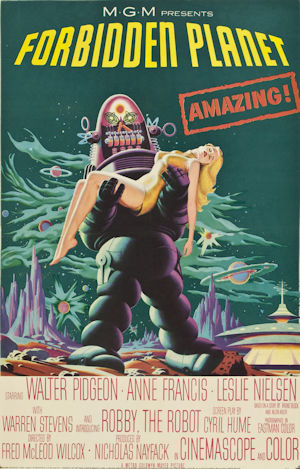 | | I love this movie so much |
[Last week, I reached a major milestone for this website with my 500th article. To celebrate, I've decided to review one of the greatest science-fiction films of all time. Enjoy!]
Science-fiction has a delicate tightrope to walk when it comes to how it represents science. On one side, you have the desire to popularize science and demonstrate its potential. Some of the best science-fiction writers can go this route and make it work, like Jules Verne and Arthur C. Clarke. But on the other side, you have the desire to make a thrilling and exciting narrative that shows the potential folly of science. It's hard to resist this route, and some of the best sci-fi stories of all time go down it, such as the works of H.G. Wells and Michael Crichton, not to mention the novel that launched the genre in the first place, Frankenstein.
1950's sci-fi cinema faced a similar dilemma. It was the dawn of the atomic age, filled with both unimaginable promise and nightmarish terror. Science was looked at with a skeptical eye--with the shadows of Hiroshima still etched in recent memory--but progress was indelible, filled with amazing new technologies like the television, the microwave oven, and nuclear energy, not to mention the remarkable advancements in medicine that saw the average life expectancy skyrocket throughout the civilized world. For every film that proclaimed the wonder of science, like The Day the Earth Stood Still, there would be another that offered dire warnings against scientific hubris, like Them!
Enter 1956's Forbidden Planet, simultaneously a prototype for the optimistic futurism of Star Trek and a movie grounded in very real fears of technological advancements overtaking mankind's ability to safely wield them. It walks the tightrope with confidence, demonstrating that science-fiction was a genre worthy of sober attention at the time, after the world had forever lost its nuclear innocence. It's an enormous big-budget spectacle that treats the genre with utmost respect and seriousness, even boasting a story loosely inspired by William Shakespeare's The Tempest.
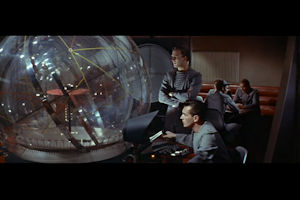 | | Sci-fi is still trying to copy this |
The story concerns a military vessel--the United Planets Cruiser C-57D--sent to search for the lost crew of the Bellerophon, an exploratory ship that landed on a desolate, Earth-like planet called Altair-IV twenty years earlier. The Cruiser finds on Altair-IV two survivors of the Bellerophon, Dr. Morbius and his daughter, Altaira--along with their highly advanced robot named Robby--living in apparent tranquility on a small patch of life in the middle of the planet's rocky emptiness. Morbius tells a vague story about the rest of his crew meeting a dire fate, but he urges Commander Adams and the rest of the men of the C-57D to leave him and his daughter in peace. Adams ignores Morbius' plea, certain there is more going on than meets the eye, and as he waits for further instructions from home, something sinister hunts his men in the night.
Though it released in the midst of the golden age sci-fi boom of the 1950's, Forbidden Planet rose the genre to a whole new level of excellence, offering the kind of high-minded spectacle audiences wouldn't see again until Stanley Kubrick and Arthur C. Clarke made 2001: A Space Odyssey over a decade later. At the same time, it presented itself as entertainment, a "space opera" before the term even existed. As the mystery of Altair-IV is unraveled, Forbidden Planet feels both sophisticated and pulpy, with characters endearing themselves to both adults and children.
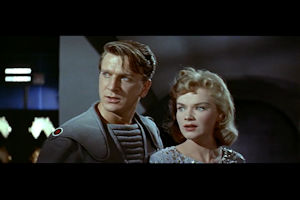 | | Leslie Nielsen and Anne Francis |
In that respect--in its ability to be both entertaining for the masses and challenging for the intellectuals--it deserves to be compared to Shakespeare, for if the bard was a master of anything, it was this: merging high art with low spectacle. While parallels can certainly be drawn between Forbidden Planet and The Tempest--most notably between the characters of Morbius and Prospero--the correlation is an exaggerated one. As both a proud sci-fi geek and a gigantic Shakespeare nerd, I feel pretty confident in writing that, beneath the surface, they are very different stories concerned with very different themes.
Still, Forbidden Planet is no less deserving of its celebrated reputation as one of the high water marks of science-fiction cinema. One could easily make the case that it is the single most important sci-fi film of a decade filled with important sci-fi films. It was the first film since Fritz Lang's Metropolis in 1927 to merge so much high-minded sci-fi with big budget pageantry, and it set the stage for future blockbusters like Star Wars.
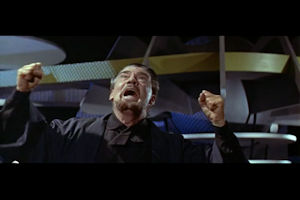 | | One of sci-fi's most interesting mad scientists |
It also carefully balances its desires to popularize science with its need to use it as an antagonistic force. Morbius is the central, tragic figure, a man unaware of how his own hubris mirrors that of the lost alien civilization he is studying, of how his own passions and obsessions threaten to destroy everything. This speaks directly to the primary fears of the atomic age and the Cold War, and it offers mankind a serious warning about the dangers of a headlong pursuit into technological possiblity without recognizing its unimaginable potential for destruction.
There are parallels to be drawn there with the rapid loss of innocence undergone by Morbius' daughter, Altaira, who has spent her entire life up to this point in peace and joyful bliss, with the wild animals and the monsters of her father's id all opting to leave her alone. Then, when she begins having sexual feelings for the men who arrive on the C-57D, she is no longer safe. As her potential grows and her humanity rises to meet it, the dangers emerge. After the end of the Second World War, the people of Earth all felt something similar happening to them.
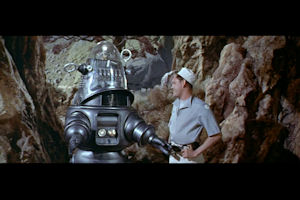 | | I'd drink with Robby any day |
But at the same time as all this is going on, you've got Robby the Robot replicating bourbon by the gallon and guys shooting lasers at a big, goofy monster from under the rim of their flying saucer. It isn't a dour, depressing exploration of innocence lost and the terrors of humanity's collective id; it's a fun genre flick that hides its heady thematic ideas beneath a thick, colorful layer of chrome, action, fantasy, and romance. It's a movie that really does have something for everyone, and it sets the bar by which all other blockbuster science-fiction films should be measured. Even today, it's a difficult bar to meet, and an almost impossible one to clear.
I have much, much more to say about this movie, and you can expect to hear some of it in my video review, which you can find below. There, I'll discuss the film's production, its profound influence of Gene Roddenberry's Star Trek, its groundbreaking usage of electronic music, the importance of Robby as an icon of sci-fi cinema, and much more. Subscribe to my YouTube channel so you don't miss more videos like it in the future!
-e. magill 5/16/2019
|
|